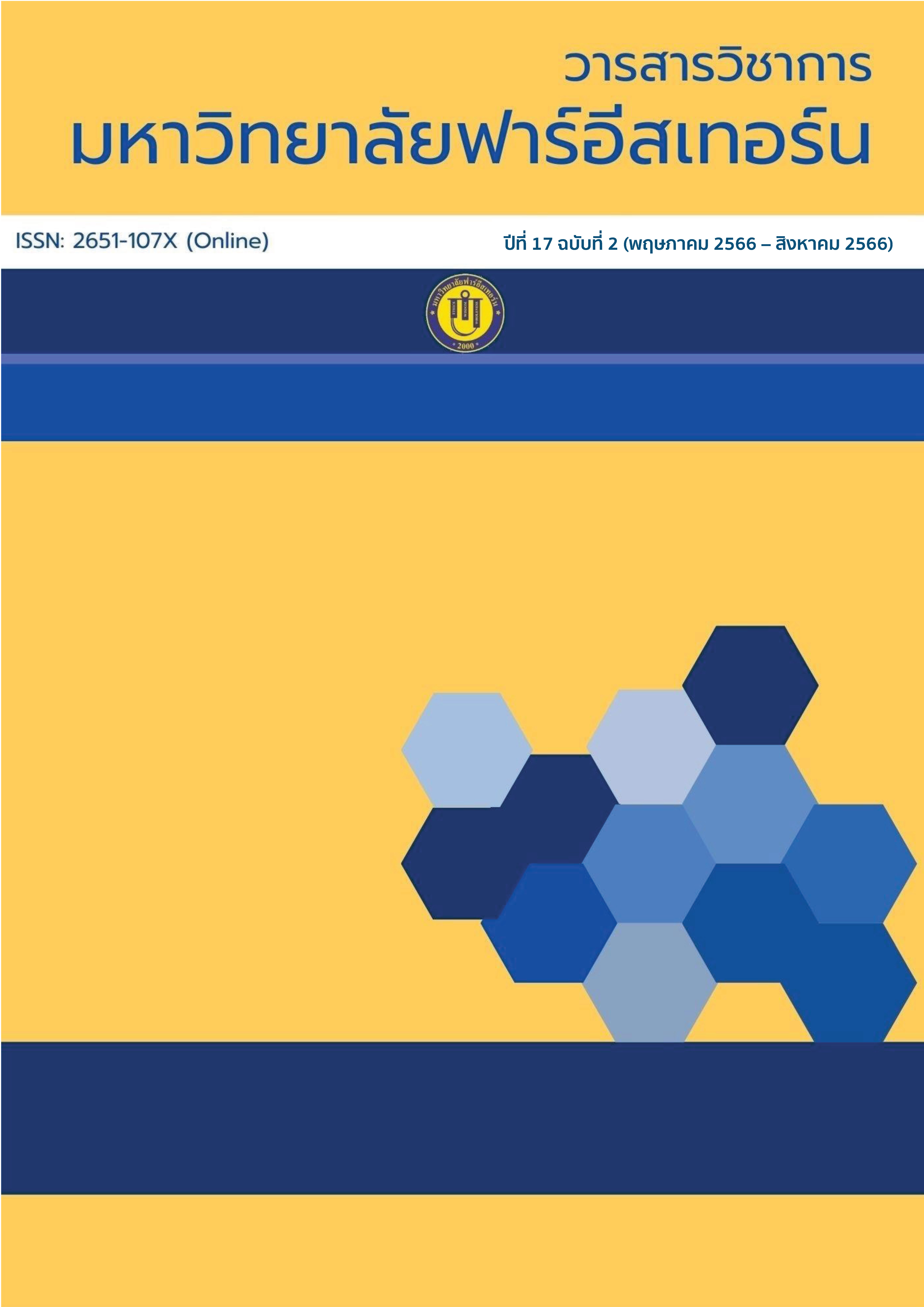Teacher Supervisors’ Competency Development Guideline Designing for Educational Management Promotion in the Digital Era
Main Article Content
Abstract
The objectives of this research were to study the conditions and problems of educational management supervision related to the competency of supervisors. Design guidelines and study the results of using guidelines for developing supervisors' competency to promote educational management in the digital era. This study was design thinking process as a research framework. The research area was the schools in Mae Wang. The target group consisted: group 1 45 supervisee, group 2 2 Supervisor 3 school director, group 3 10 teacher supervisors 3 supervisee. The research instruments were 1) a questionnaire on the conditions and problems of educational management supervision related to supervisors' competency, 2) an interview form on the development of supervisors' competencies, 3) an observation form on supervisors’ performance behaviors, and 4) an interview form for the supervisees about the supervisors’ performance. The results were as follows. The conditions and problems of educational management supervision related to the competency of supervisors in terms of knowledge in supervision, the overall supervision skills, the overall promotion of educational management in the digital era were at a moderate level. Guidelines for the development of supervisors' competency to promote educational management in the digital era consisted of a 4-step process. Step 1 was a needs assessment. Step 2 was an activity design. Step 3 was an implementation. Step 4 was a monitoring. The results of using the guidelines to develop the competency of supervisors promoting educational management in the digital era found that supervision work behaviors that promoted educational management in the digital age were generally practiced at 84 percent.
Article Details

This work is licensed under a Creative Commons Attribution-NonCommercial-NoDerivatives 4.0 International License.
1. Any views and comments in the Journal of Social Innovation and Lifelong Learning are the authors’ views. The editorial staff have not to agree with those views and it is not considered as the editorial’s responsibility.
2. The responsibility of content and draft check of each article belongs to each author. In case, there is any lawsuit about copyright infringement. It is considered as the authors’ sole responsibility.
3. The article copyright belonging to the authors and The Far Eastern University are copyrighted legally. Republication must be received direct permission from the authors and The Far Eastern University in written form.
References
กระทรวงศึกษาธิการ. (2566). ประกาศกระทรวงศึกษาธิการ เรื่อง นโยบายและจุดเน้นของกระทรวงศึกษาธิการ ประจำปีงบประมาณ พ.ศ. 2566. https://www.moe.go.th/360policy-and-focus-moe-2023/
กิตติศักดิ์ อังคะนาวิน. (2560). รูปแบบการนิเทศภายในสถานศึกษาสังกัดสำนักงานเขตพื้นที่การศึกษาประถมศึกษาชลบุรี เขต1. วารสารวิจัยทางการศึกษาคณะศึกษาศาสตร์มหาวิทยาลัยศรีนครินทรวิโรฒ, 13(2), 17–30. https://ejournals.swu.ac.th/index.php/jre/article/view/11038
กีรติ ยศยิ่งยง. (2549). การจัดการความรู้ในองค์การ และกรณีศึกษา. มิสเตอร์ ก๊อปปี้.
จีระพงษ์ โพพันธุ์. (2562). ความหมายของเทคโนโลยี. https://kru-it.com/design-and technology-m1/definition-of-technology/
ชัษษพณขิ์ จันวงค์เดือน และ วริญรดา บรรหาร. (2565). หลักสูตรแกนกลางและหลักสูตรฐานสมรรถนะ. วารสารครุทรรศน์มหาวิทยาลัยราชภัฏอุบลราชธานี, 2(2), 89–102. https://so06.tci-thaijo.org/index.php/JER/article/view/251998
ทิพวรรณ ถาวรโชติ. (2564). รูปแบบการนิเทศด้วยเครือข่ายความร่วมมือเพื่อส่งเสริมประสิทธิผลของสถานศึกษา สังกัดสำนักงานเขตพื้นที่การศึกษามัธยมศึกษา [วิทยานิพนธ์ปริญญามหาบัณฑิต, มหาวิทยาลัยนเรศวร]. http://nuir.lib.nu.ac.th/dspace/bitstream/123456789/3380/3/61030440.pdf
บุญชม ศรีสะอาด. (2556). วิธีการทางสถิติสำหรับการวิจัย เล่ม 1 (พิมพ์ครั้งที่ 5). สุวีริยาสาส์น.
ประยุทธ์ จันทร์โอชา. (2562). คำแถลงนโยบายของคณะรัฐมนตรี. สำนักงานเลขาธิการคณะรัฐมนตรี.
พุทธชาด แสนอุบล. (2560). สภาพปัญหาและแนวทางการปรับปรุงการนิเทศภายในโรงเรียนมัธยมศึกษา สังกัดสำนักงานเขตพื้นที่การศึกษามัธยมศึกษา เขต 29 [วิทยานิพนธ์ปริญญามหาบัณฑิต, มหาวิทยาลัยบูรพา].
ไพศาล ไกรสิทธิ์. (2541). รายวิชาการพัฒนาตน (เอกสารคำสอน). คณะครุศาสตร์ สถาบันราชภัฏหมู่บ้านจอมบึง.
ล้วน สายยศ และ อังคณา สายยศ. (2543). เทคนิคการวิจัยทางการศึกษา (พิมพ์ครั้งที่ 3). สุวีริยาสาส์น.
ศิวาพัชญ์ บำรุงเศรษฐพงษ์, ภูริส ฐานปัญญา, และ เกรียงไกร สัจจะหฤทัย. (2563). การเรียนการสอนแบบไฮบริด (Hybrid Learning) กับการพัฒนาคุณภาพการศึกษาในศตวรรษที่ 21. วารสารนาคบุตรปริทรรศน์, 12(3), 213-224. https://so04.tci- thaijo.org/index.php/nakboot/article/view/245900
สงัด อุทรานันท์. (2529). การนิเทศการศึกษา:หลักการ ทฤษฎีและปฏิบัติ (ฉบับปรับปรุงเพิ่มเติม) (พิมพ์ครั้งที่ 2). มิตรสยาม.
สุกัญญา แช่มช้อย. (2562). การบริหารสถานศึกษายุคดิจิทัล. โรงพิมพ์แห่งจุฬาลงกรณ์มหาวิทยาลัย.
สุกิจ อัครมหาเสนาวงศ์. (2564). แนวทางการบริหารจัดการเพื่อพัฒนาสมรรถนะครูด้านดิจิทัลในโรงเรียนประถมศึกษาขนาดเล็ก [วิทยานิพนธ์ปริญญามหาบัณฑิต, มหาวิทยาลัยราชภัฏเชียงราย].
สุจิตรา ธนานันท์ . (2552). การพัฒนาทรัพยากรมนุษย์ (พิมพ์ครั้งที่ 4). คณะรัฐประศาสนศาสตร์สถาบันบัณฑิตพัฒนาบริหารศาสตร์.
สำนักงานคณะกรรมการข้าราชการพลเรือน. (2563). แนวทางการพัฒนาบุคลากรภาครัฐ พ.ศ.2563 - พ.ศ.2565. https://www.ocsc.go.th/civilservice
หน่วยศึกษานิเทศก์ สำนักงานคณะกรรมการการศึกษาขั้นพื้นฐาน. (2562). แนวทางการนิเทศภายในโดยใช้ห้องเรียนเป็นฐานเพื่อพัฒนาคุณภาพของผู้เรียน. http://krukob.com/web/ wpcontent/uploads/2020/.pdf
องค์การอาหารและเกษตรแห่งสหประชาชาติ. (2565). How to design capacity development interventions and ensure their sustainability. https://www.fao.org/capacity-development/resources/practical-tools/design-capacity-development/en/
อติพร เกิดเรือง. (2560). การส่งเสริมการเรียนรู้ในศตวรรษที่ 21 เพื่อรองรับสังคมไทยในยุคดิจิทัล. วารสารวิชาการมหาวิทยาลัยราชภัฏลำปาง, 6(1), 173–184. https://so04.tci-thaijo.org/index.php/JLPRU/article/view/91025
Briggs, Thomas H. & Joseph Justman. (1952). Improving Instruction through Supervision. McMillan.
Cronbach, L. J. (1970). Essentials of Psychological Test (5th Ed.). Harper Collins.

